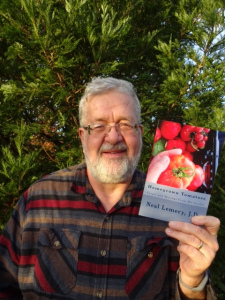
by Neal Lemery
A familiar phrase we often use is that someone would give the shirt off their back to help someone else. Last week, that became reality for me and a young man, as we drove away from the prison where he’d been the last two and a half years. Our destination was a halfway house, where he could restart his life, find a job, and be a productive citizen. He has big plans: vocational school, a job, long hikes in the woods, a family someday.
Some will argue that the hardships and obstacles facing a parolee is part of his “punishment”, that one shouldn’t do the crime if you can’t do the time. Felons don’t deserve our kindnesses, and should be treated as the scum that they are. They deserve their hardships, and it is their lot in life.
I suppose those attitudes are easy to come by, and that the life of those getting out of prison is low on many people’s priorities and compassion. Perhaps, until you get to know a person, and hear their story, until you match the face with the stories they tell of their lives.
“Lock ‘em up and throw away the key” and the problem will go away. Right?
Well, those men and women will return to society, join the workforce, and will have family and friends, just like everyone else. How they go about their lives, and the decisions they make, is fundamentally shaped by the resources they have when they walk out of the prison gates.
My young friend left prison the other morning with only a pair of pants, a sweatshirt, and shoes provided by the prison. No underwear, no socks, no coat, and no cash in his pocket. His life savings, including the federal stimulus money (which we all received last year) was in a check. Of course, he has no bank account, no ID except a prison issued ID card. His lost driver’s license hadn’t been replaced.
He has an Oregon Trail food stamp card, but of course, he needed a phone to activate that. Yep, you guessed it. He had no phone. His family could have shipped him a phone that he could have picked up at his release that morning, but the prison never told them about that option.
The check for his money was $300 short. The prison had decided to fine him for a rule infraction last week, and took away his inmate phone privileges on top of that.
We headed off to a city four hours away, to see his probation officer, and to check in at the halfway house. But, he wasn’t sure where his new home was, or what it looked like.
He got out at dawn, when the sweatshirt kept him warm. Later on, it warmed up and he started to sweat. He put on a determined face, not wanting to complain to me. No one else had offered to pick him up and make the trip with him, so I was the only way to get him where he needed to go.
“Do you have anything else to wear?” I asked, knowing the answer as all his worldly possessions were loosely piled in a cardboard box in the back seat of my truck.
I’d needed to do an overnight trip to pick up my friend, due to the early morning release time, so I had a few clothes in my suitcase. I dug out a shirt I’d bought for myself a few weeks ago, and gave it to him.
“Oh, no, I can’t take that,” he said.
But I insisted and he managed a smile as he slipped it on. It was soft, colorful and new, something he hadn’t experienced in the last few years. He looked away at the changing landscape, filled with fields, trees, far away mountains, and blue sky, things he hadn’t seen in his life for too long of a time. A tear rolled down his cheek, and I looked away, concentrating on my driving, and giving him some quiet time. A tear fell onto my face, too, being reminded of simple things, and how so much in life I take for granted.
What I call Freedom Day is sacred space, where emotions often too intense to comprehend fill one’s heart. Often, there are no words, only tears and hugs.
We stopped along the way a few times — fabulous coffee in a small town’s only coffee shop, breathing fresh air at a roadside rest area overlooking a display of bright fall leaves and a river. As we took in the serenity of the river, we found no words to speak. He turned to me and embraced me, his hug saying it all.
I parked outside of the probation office, waiting for my friend to complete his check in, and finding out where he was going to live. I watched a drug deal go down across the street, and the parade of customers going to the nearby pot shop, some of whom had just left the probation office.
He settled into his new home, and the staff introduced themselves to me. Good, deeply committed people, being kind and hospitable, as we settled my friend in, making his bed, finding out where the bathroom and the kitchen were.
“This will be fine,” he said. “I’ll be OK.”
He walked me to my truck. It was time to say goodbye. It had been a good day, good conversations, a trip of amazing natural beauty, and peace, a deepening friendship. And freedom.
I slipped into Dad Mode, giving him one last hug, and a short sermon of Dad Advice, giving him one last dose of love, encouragement, and fatherly advice.
“I don’t have any money,” he reminded me, hesitation catching in his voice. We’d had a talk earlier about his lack of funds, and I’d promised to spot him some cash, something to carry him through until he could get to the bank. I apologized for forgetting my commitment, and dug out my wallet.
“That’s too much,” he said, but I wouldn’t take any back.
“Take yourself out for coffee,” I said, and added another twenty.
“Here’s your shirt,” he said. He started to unbutton it.
“That’s your shirt now,” I said. “It’s part of our deal, part of what we needed to do today.”
I got in my truck and drove down the street, lowering the window to give him one last wave. In the rearview mirror, I saw him wave back, and wipe away something on his face. A few tears wetted my face, and I gulped down what would have been a full-blown sob session.
The road home was quiet. I was lost in my thoughts. This wasn’t the first time I’d taken a young man from what we call “correctional institutions” to a fresh start. Freedom Day, I call it. And, sadly, the stories run together. The lack of clothes, the cardboard box of possessions, the lack of financial care, the uncertainty of where they will spend the night and the next few months of their lives. There’s the scarcity of family, too, and that points back to understanding why they were locked up to begin with.
I’ve read where the cost of housing one prisoner in our state prison system is close to $60,000 a year, and that mental health services, vocational training, and transitional housing are often the first to be cut. My friend needs all of that. The system isn’t dealing with his depression, PTSD, and anxiety, not to mention his alcohol and drug issues, those necessities somehow not part of his life in prison, not part of his parole plan.
I gave him my shirt, and a few bucks for coffee. And he gave me hugs, stories of his dreams, and, at the end of the day, a big smile. He filled my heart. It was a good trade.

Books: NEW book – Building Community: Rural Voices for Hope and Change; Finding My Muse on Main Street, Homegrown Tomatoes, and Mentoring Boys to Men

